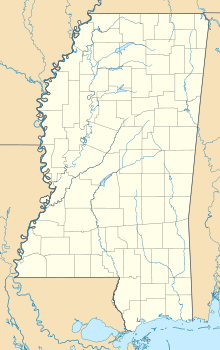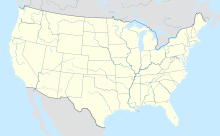Battle of Brice's Cross Roads
| Battle of Brice's Cross Roads Battle of Tishomingo Creek Battle of Guntown |
|||||||
|---|---|---|---|---|---|---|---|
| Part of the Western Theater of the American Civil War | |||||||
 The Battle of Brice's Cross Roads, June 10, 1864 |
|||||||
|
|||||||
| Belligerents | |||||||
|
|
|
||||||
| Commanders and leaders | |||||||
|
|
|
||||||
| Strength | |||||||
| 3,500 cavalry | 4,800 infantry 3,300 cavalry 22 guns |
||||||
| Casualties and losses | |||||||
| 96 killed 396 wounded |
223 killed 394 wounded 1,623 missing/captured 16 guns |
||||||
|
Location within the state of Mississippi
Location within the state of Mississippi
|
|||||||
The Battle of Brice's Cross Roads (also known as the Battle of Tishomingo Creek and the Battle of Guntown) was fought on Friday, June 10, 1864, near Baldwyn, Mississippi, then part of the Confederate States of America. A Federal expedition from Memphis, Tennessee, of 4,800 infantry and 3,300 cavalry, under the command of Brigadier-General Samuel D. Sturgis, was defeated by a Confederate force of 3,500 cavalry under the command of Major-General Nathan B. Forrest. The battle was a victory for the Confederates. Forrest inflicted heavy casualties on the Federal force and captured more than 1,600 prisoners of war, 18 artillery pieces, and wagons loaded with supplies. Once Sturgis reached Memphis, he asked to be relieved of his command.
In March 1864, Lieutenant-General Ulysses Grant, newly named General in Chief of the Armies of the United States, and his most trusted subordinate Major-General William Tecumseh Sherman, planned a new, coordinated strategy to cripple the Confederate States and win the war. Grant would smash General Robert E. Lee's army in Virginia and head for Richmond. At the same time, Sherman would destroy the other main Confederate force, the Army of Tennessee, and seize the key city of Atlanta. Calling itself the "Gate City of the South," Atlanta was the strategic back door to the Confederate States. It was the South's most productive arsenal after Richmond and a critical transportation hub: Four railroads radiating from the city carried supplies to their forces.
...
Wikipedia


